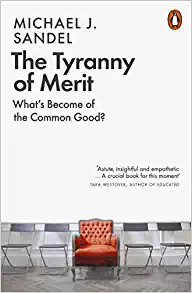 Highly recommended.
Highly recommended.
But a perfect meritocracy banishes all sense of gift or grace. It diminishes our capacity to see ourselves as sharing a common fate. It leaves little room for the solidarity that can arise when we reflect on the contingency of our talents and fortunes. This is what makes merit a kind of tyranny, or unjust rule. –Sandel, p. 25.
In his new book, The Tyranny of Merit, political philosopher Michael Sandel is worried about our democracy and sets out to excavate the roots of the all too apparent decline in both social bonds and respect in public discourse. In this quick and thoughtful read, Sandel draws upon his characteristically commonsensical prose to argue that a pernicious myth of meritocracy has eroded a sense of common good in the United States.
This book joins a series of recent critiques of meritocracy including Daniel Makovitz’s 2019 The Meritocracy Trap. Like Makovitz, Sandel takes aim at inequality, arguing that our meritocratic system is now sowing discontent even amongst its beneficiaries; however, Sandel is more squarely focused on restoring the common good and democratic politics. Populism, Sandel argues, is a response to the tyranny of merit and the misguided notion that social positions in our society are near perfect reflections of effort and talent. This notion is what allows the successful to imagine their success is of their own making–owing to their special, superior virtue. It also allows us to imagine those less no successful are conversely not so virtuous. He reminds us that most Americans do not in fact have a college degree. He notes, “by telling workers that their inadequate education is to blame for their troubles, meritocrats moralize success and failure and unwillingly promote credentialism—an insidious prejudice against those who have not been to college” (p. 89).
For Sandel, credentialist prejudice along with an ethic of success are core dimensions of meritocratic hubris. “To reinvigorate democratic politics, we need to find a way to a morally more robust public discourse, one that takes seriously the corrosive effect of meritocratic striving on the social bonds that constitute our common life” (p. 31). Here we see this book is also a poignant call for the moral renewal of civic life. Ultimately, Sandel makes a plea for humility as a civic virtue as an antidote to the meritocratic hubris at the root of our current political dysfunction. “Humility is the beginning of the way back from the hard ethics of success that drives us apart. It points beyond the tyranny of merit toward a less rancorous, more generous public life” (p. 227).




